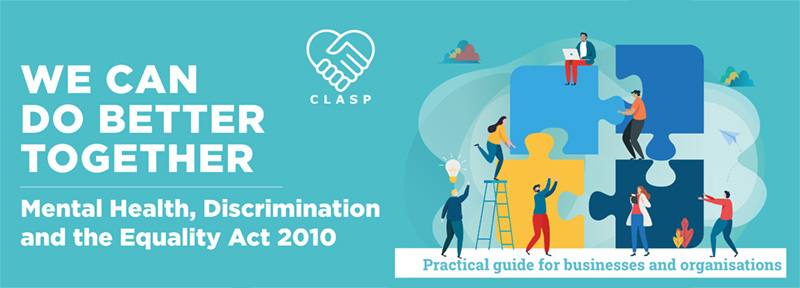
Mental Health and the Equality Act - new guidance from CLASP Charity


Coinciding with World Mental Health Day’s theme of seeking equity in an unequal world, CLASP Charity recently published ‘We Can Do Better Together: Mental Health, Discrimination & the Equality Act’, dedicated to all who suffer from mental ill-health.
The guidance from CLASP Charity is designed to support public and private sector organisations to be better aware of their legal anticipatory duty under the Equality Act and to be able to take the appropriate steps to make reasonable adjustments for those with a mental-ill health disability.
Founder and CEO of CLASP Charity, Kenny Johnston, writes in the guidance about his own lived experience of mental ill-health discrimination which triggered his suicide attempts and the importance for all service providers to support people with mental ill-health disabilities, as entitled through their statutory rights.
The anticipatory duty to provide a reasonable adjustment(s) requires service providers to take proactive steps to ensure people with disabilities can access and communicate with the services. This goes beyond simply avoiding discrimination and requires the service provider anticipate the needs of potential disabled customers for reasonable adjustments.
The work gathered in the guidance to emphasise good and bad practice in this area and to highlight how organisations can improve their way of working is important, particularly as we begin to recover from the coronavirus pandemic.
In the guidance, CLASP Charity highlight how by engaging in simple, positive steps which we can all take together, service providers can make a difference and improve the lives of people who are experiencing mental ill-health.
“Section 6 of the Equality Act 2010 states disability is a physical or mental impairment,” says Kenny. “As a society, we have adapted our everyday approaches to automatically offer reasonable adjustments to people who have sight, hearing or other physical disabilities, such as braille, sign language, lifts and ramps, along with other auxiliary aids via services providers and employers. The same legal duty and responsibilities on service providers and employers that lead to those everyday changes applies to providing reasonable adjustments for people with mental ill-health disabilities. The Equality Act 2010 clearly affirms that legal responsibility.”
To support organisations with this, CLASP Charity outline a Prevent, Promote, Support (PPS) model which they have developed, and which has already been successfully implemented by public and private sector organisations, including with our friends at Thrive West Midlands.
Writing in the foreword, Thrive LDN director, Dan Barrett, added: “Thrive LDN is supportive of the work being undertaken by CLASP Charity, led by Kenny Johnston, to highlight the importance of the anticipatory duty within the Equality Act.
“This is a timely and helpful resource for all businesses and organisations to explore and see how the Prevent, Promote, Support (PPS) model developed by CLASP can be considered and put into practice. It is another example of CLASP Charity’s positive campaigning to embed equality of access and support for those with hidden disabilities, such as poor mental health.”